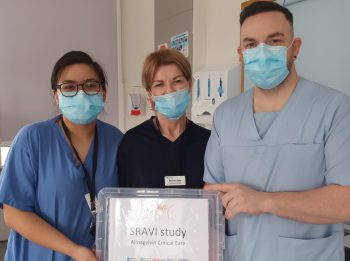16/05/2023

Altnagelvin Hospital has become the first hospital in Northern Ireland to offer critical care patients, their families and staff, the opportunity to test out a new lipreading app. The recently launched research study, led by Queen’s University, Belfast is currently underway in the Critical Care Unit in the hospital.
Within Critical Care, patients are often rendered suddenly ‘voiceless’ due to the insertion of a tracheostomy tube. Loss of voice is recognised as one of the most stressful events during admission, with patients describing frustration, panic, and a sense of powerlessness. Emotional distress experienced during critical care is also a predictor of negative psychological outcomes during recovery with anxiety, depression and Post Traumatic Stress Disorder (PTSD) all reported as frequent occurrences for many critical care survivors.
Speech Recognition Application for the Voice Impaired (SRAVI) is a novel communication app developed by Liopa, a Belfast-based company. The app can be downloaded onto any smart device with a camera and when the device is held in front of a patient, SRAVI tracks lip movement and identifies phrases being mouthed into text on the device screen within a few seconds.
The research study is being driven forward by Western Health and Social Care Trust Staff Nurse Carla McClintock. Carla said: “I know only too well the impact of sudden voicelessness. As an ICU nurse my clinical practice allows me to see first-hand the experience of tracheostomy patients. I have also been that patient myself, lying awake and alert in an ICU bed but terrified by being unable to speak. Indeed, it is my own lived experience of having had a tracheostomy myself that really drives my motivation for this project.”
The aim of the study is to establish the feasibility and acceptability of SRAVI for adult critical care patients with a tracheostomy. Providing patients with access to SRAVI during their critical care stay will enable its accuracy to be measured and also patients capability in its use to be assessed. Interviews with patient, relatives and staff will explore their experiences of using SRAVI. Patient follow-up at 3 months post-discharge will assess quality of life and psychological outcomes.
Carla concluded: “As staff we support patients to gain an effective ‘voice’ as such through various communication strategies, but these often have limitations in critically ill patients. SRAVI could potentially offer a new and novel approach to communication with tracheostomy patients and give a voice to the voiceless.”




